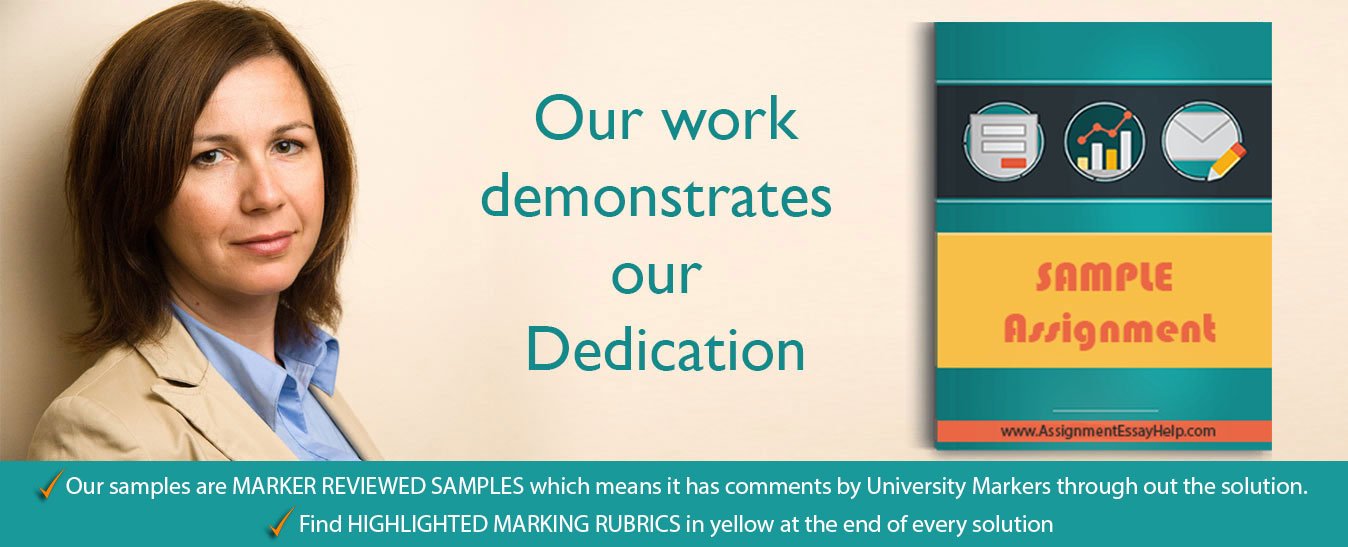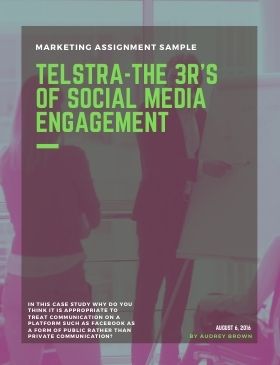
You can download the solution to the following question for free.
For further assistance in Marketing Assignment help, please check our offerings in Marketing solutions. Our subject-matter-experts provide online assignment help to entrepreneurship and marketing students from across the world and deliver plagiarism free solution with free Turnitin report with every solution.
(AssignmentEssayHelp do not recommend anyone to use this sample as their own work.)
Marketing Assignment Question
- Why do you think it is appropriate to treat communication on a platform such as Facebook as a form of public rather than private communication?
- Why shouldn't you post anything you wouldn't want your boss / future employer to read?
- Although Telstra's social engagement policy is designed primarily to protect the company and the brand, how do you think their policy also provides protection to employees?4.Your manager is developing a new social media policy. He believes it should simply be a list of dos and don'ts. Explain to him why this policy should be grounded in ethics.…..
Marketing Assignment Solution for Social Media Marketing Strategy of Telstra
Answer 1.
As more and more people are commenting, sharing, liking and tweeting every little nugget of their life, it is becoming increasingly evident that social media use has moved from a form of private communication to public communication. Despite privacy settings, social media channels like Facebook use data in myriad ways to be able to monetize these businesses. Facebook uses our data to provide us with services and features which may be useful to us. However, Facebook allows access to public information to companies and service providers who design these products (Facebook, 2014). Hence, whatever information we put out there, is actually open to the public to access. This information may be mined further for analysis, which puts any communication we make on Facebook out in the public domain. Even during personal use, we may speak of events regarding our work life, and this today forms a part of the communication mix which goes out to consumers. Hence, a negative feedback on the company by an employee could contribute towards an unfavorable sentiment on social media. This could have implications for the organizations we work for, and most importantly, our work itself.
Read more in the complete solution PDF document at the end of this page.
Answer 2.
The terms of use explicitly state
'When you publish content or information using the Public setting, it means that you are allowing everyone, including people off of Facebook, to access and use that information, and to associate it with you (i.e., your name and profile picture).' (Facebook, 2013)
This essentially means that our regular updates on Facebook are open for search and analysis to people who are not even on Facebook. It has been increasingly found that employers are using social networking sites like Facebook and Myspace for conducting background checks on employees, so much so, that employers are rejecting potential employees or firing current employees' basis such a check (Lenard, 2012). Therefore, anything we post on a social networking site goes a long way in constructing our online persona. In the absence of any face to face communication, a negative online persona could have an adverse impact on your future employer's perception of you. A consistent tendency to post drunken party pictures or rants could put one in a negative light, even though one may be a thorough professional in real life. Negative posts / comments provided in a slanderous or defamatory manner may cause the future employer to red flag one as a potential 'problem' employee, thus considerably affecting one's chances of seeking gainful employment.
Read more in the complete solution PDF document at the end of this page.
Answer 3.
Developing a social media policy which consists of a list of dos and don'ts has potential pitfalls. First of all, no matter how comprehensively the policy is written, it cannot actually cover all the possible scenarios which an employee / contractor may face. An objective list of do's and don'ts will not be a useful guideline to follow. Also, an objective list lacks context. Most scenarios which an employee may face will be heavily embedded in the context of the situation, and simple Yes/No ways to deal with them would be largely ineffective. Such a policy could bring about a feeling that the company is also infringing on their freedom of speech and expression, which can cause employee discontent and disengagement.
Hence, a social media policy should have its bedrock in ethics. An ethical grounding will ensure that with rights come responsibility. It will assign levels of responsibility to individuals about their personal use of social media. This in no way infringes on their freedom of expression and at the same time provides them with a handy rubric to consult when in doubt. In the event that the company chooses to monitor the employees' social media usage, a policy which is grounded in ethics will be better placed to explain the company's behavior and help employees understand the reasons behind such monitoring. This will allow for building of trust between the employees and the company. It will allow for clear guidance and set the boundaries to avoid potential abuses (Institute of Business Ethics, 2011). Overall, a broad based strategy grounded in ethics and values and not merely compliance will allow employees to tackle hitherto unseen situations in an ever changing environment. A value based approach will also ensure that the rules are actually in line with today's realities. This will ensure that the employees are more willing to abide by them (Ethical Advocate, 2013). An ethically grounded policy can reinforce company values and reduces instances of policy violations.
Read more in the complete solution PDF document at the end of this page.
(Some parts of the solution has been blurred due to privacy protection policy)


 WhatsApp Us
WhatsApp Us